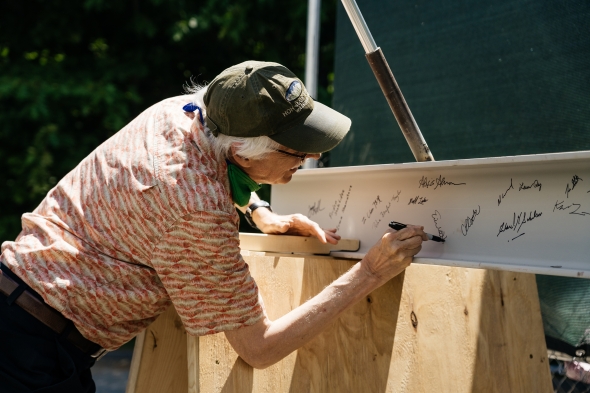

Major expansion of technology, teaching, and research on target to open in fall 2021.
The final beam for the new Center for Engineering and Computer Science went into place in late June, marking a major milestone toward the opening of the state-of-the-art research and teaching facility that will build upon Dartmouth's long-time commitment to technology excellence rooted in the liberal arts.
The 160,000-square-foot Center for Engineering and Computer Science is on track to open during the fall of 2021. An integral part of Dartmouth's tech hub located in the West End of campus, the facility will house the enhanced Department of Computer Science, the Magnuson Center for Entrepreneurship, and a significant expansion of Thayer School of Engineering. The center and related investments in engineering and computer science faculty recruitment are central elements of the vision advanced by President Philip J. Hanlon '77 to foster interdisciplinary, inter-school, and intergenerational collaboration that will prepare future leaders to tackle many of the world's most difficult issues.
"At a time when humanity faces grave challenges—access to affordable energy and climate change, public health challenges of historic global magnitude, ongoing threats to cybersecurity—it is imperative that our future leaders and innovators take on a human-centered approach to creating the tools, technology, and systems necessary for improving the human condition," says Thayer Dean Alexis Abramson.
The $200 million design and construction project, for which $166 million has been raised, is funded entirely through private gifts secured as part of The Call to Lead campaign. To date, 60 gift commitments have been received, and fundraising is expected to continue intensively over the next year.

Fostering an Appreciation for Technology in All Undergraduates
Engineering and computer science are two of the fastest-growing majors at Dartmouth—the number of computer science majors has more than quadrupled during the past decade, and the number of Thayer undergraduates receiving degrees annually has nearly doubled. The percentage of graduating seniors going into the technology sector has increased from 6 percent in 2013 to 15 percent today.
Both programs are also attracting large numbers of non-engineering and computer science majors. Currently, 70 percent of all Dartmouth undergraduates take at least one engineering or computer science course, and many popular courses are greatly over-subscribed.
Computer science and engineering will be adding more than 40 faculty members in the two areas in the coming years. When realized, the investments in faculty and facilities will enable all undergraduates to explore technology within Dartmouth's undergraduate liberal arts curriculum and will support greater collaboration with medical and business faculty in research, course design, and entrepreneurial ventures.
"Undergraduates have extraordinary opportunities to partner in discovery and innovation at Dartmouth," says Trustee Emeritus and Campaign Co-Chair Rick Kimball '78. "That was true in 1964, when BASIC was developed here and revolutionized computing, and it continues today. With this new center, we are building on our points of pride and reaffirming our commitment to prepare leaders with an appreciation for the potential of technology."
A Crossroads for Technology and Innovation at the End of Tuck Mall
The new center, for which Dartmouth will seek LEED Gold certification, is one of several major investments in academic programs and facilities occurring at the West End of campus. Computer science, the Magnuson Center, and the Arthur L. Irving Institute for Energy and Society are joining long-time West End residents Tuck School of Business, Feldberg Business and Engineering Library and Thayer School.
As part of this vibrant district, the new center will expand learning and research opportunities for engineering and computer science majors, fuel research, help bring innovative ideas successfully to market, and prepare leaders who can think about technology in a critical, integrated manner. Scholarship in the new building will build on areas of institutional distinction such as cybersecurity, biotechnology, product design, energy technology, imaging, and machine learning. Academic activity throughout the light-filled, open, accessible building will be organized by research interest, not by departments.
Teacher-scholars from the Faculty of Arts and Sciences, Geisel School of Medicine, and Tuck School of Business will have opportunities to partner in the center's scholarship and teaching, as the building's labs will bring together faculty, graduate students, and undergraduates in collaborative environments. Dynamic spaces throughout the new building, including advanced, technology-enabled classrooms, labs, and makerspaces, will allow more courses to feature hands-on design, fabrication, and problem-solving experiences.
"Faculty from different Dartmouth departments and schools will work side by side in the new center, focusing on shared ideas and interests, co-teaching courses, and working together to engage students as their research partners," says Professor of Computer Science Devin Balkcom, who is the department's chair. "Experiential learning and the open exchange of ideas will be pervasive throughout the center. This building will be a magnet for prospective students who want to engage in hands-on learning and work with teacher-scholars who are leaders in their fields."
Importantly, the project includes a 340-vehicle parking garage underneath the academic spaces that will provide additional parking options in the West End. When completed, the center will be the second-largest academic building on campus, only slightly smaller than the Class of 1978 Life Sciences. And, with its parking garage, the facility is the largest construction project in Dartmouth's history.
Topping-off ceremonies are a centuries-old tradition marking the moment when a new building's frame is complete and work crews can start enclosing spaces. More than 800 alumni, students, parents, and friends watched remotely as the center's final steel beam was lifted into place on the day of the event.
Wilson HGA Architects designed the building, Michael Van Valkenburgh Associates is providing the landscape design, and Turner Construction is managing the project.
Watch the topping-off ceremony, a time-lapse history of the center's construction, and see weekly updates on the project.